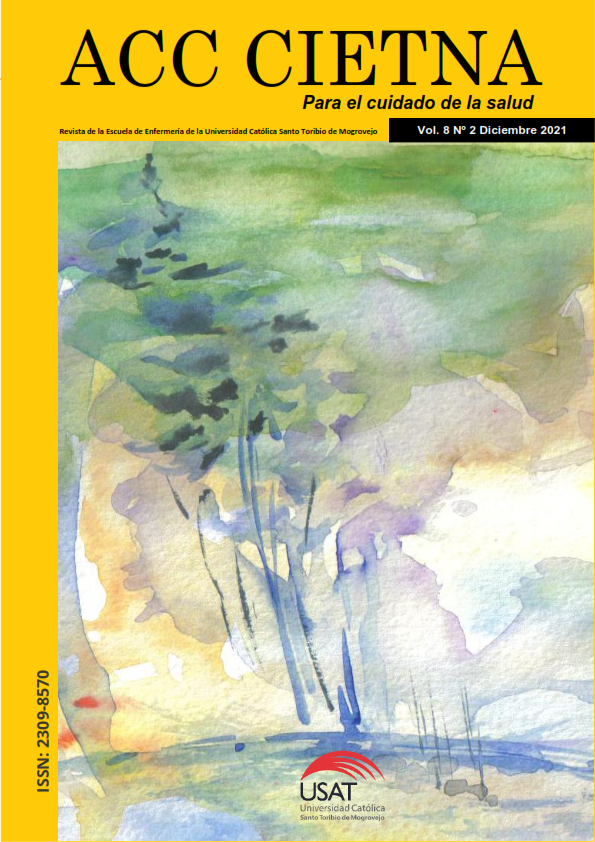Abstract
Self-medication is a latent problem in our society. It is the own initiative or decision to take drugs, the consumption of drugs regardless of their origin, or medical prescription1,2. This has been increasing and has become a phenomenon that is highly studied by researchers. Thus, in pre-pandemic times, self-medication was a considerable problem in several countries, although with differences between countries in Europe and Latin America. So we have, in Spain3; The National Health System announced that in 2017 15.3% of people self-medicate. Also, in Mexico4; 86% consume medications without a doctor's prescription.
Abstract
Self-medication is a latent problem in our society. It is the own initiative or decision to take drugs, the consumption of drugs regardless of their origin, or medical prescription1,2. This has been increasing and has become a phenomenon that is highly studied by researchers. Thus, in pre-pandemic times, self-medication was a considerable problem in several countries, although with differences between countries in Europe and Latin America. So, we have, in Spain3; The National Health System announced that in 2017 15.3% of people self-medicate. Also, in Mexico4, 86% consume medications without a doctor's prescription.
However, fear, the saturation of hospitals and the economic impact of the COVID-19 pandemic5 has encouraged us to carry out this practice more frequently and even increased the prevalence in the young population6. Since they justified the practice by diverse factors among them; 33.49% of the young people relate the similarity of the symptoms to past illnesses, 19.17% perceived the illness as something mild, and 18.24%, from the economic aspect, self-medication was cheaper for them7. In addition, in Peru, at the beginning of the pandemic, kits were distributed to treat mild coronavirus disease; Therefore, when some were hospitalized for the disease, they reported having self-medicated with ivermectin that they had given to their relatives8.
In addition, the pandemic has increased the use of tranquilizers to treat anxiety and insomnia, disorders that have increased as a result of the pandemic9. In this sense, some, out of fear and anxiety, have chosen to self-medicate substances such as chlorine dioxide, vitamins, herbs, chloroquine10. Meanwhile, medicines were also used to improve the immune system such as vitamins C, D, A and B and zinc supplements11.
Finally, the population, due to SARS-CoV-2 as a preventive and reassuring action, resorted to the collection of drugs and their eventual self-consumption without consulting a prescription. However, it was an erroneous measure because there are drugs such as antibiotics that weaken the immune system12.
Faced with the foregoing, it is necessary to reflect that a consequence of self-medication is resistance to antibiotics, this increases the lethality of the disease because treatment becomes more difficult due to their loss of efficacy. Therefore, it is important to implement surveillance of the sale of antibiotics, anxiolytics, etc. with prescription in all pharmacies. In addition, the population must be made aware of the risks of self-medication for health since it can cause resistance to antibiotics and dependence on anxiolytics and analgesics.
Referencias
- Caamano F, Figueiras A, Lado E, Gestal J. La automedicación: concepto y perfil de sus “usuarios”. Gaceta Sanitaria [Internet]. 2000 [Consultado 28 Sept 2021]; 14(4): 294-299. Disponible en:
- Hernández A. Farmacología General: Una guía de estudio. Madrid: McGraw-Hill; 2013. 242 p.
- Gobierno de España. Las cifras de la automedicación en España. Revista Dirección General de Tráfico [Internet]. 2019 [Consultado 2 Oct 2021]. Disponible en:
- DoctoraliaPress. 86% de mexicanos toma medicamentos sin prescripción médica. Estudio sobre la automedicación 2019 [Internet]. 2019 [Consultado 2 Oct 2021]. Disponible en: https://press.doctoralia.com.mx/79663-86-de-mexicanos-toma-medicamentos-sin-prescripcion-medica
- Soler F, Calderón C, Pérez A. El Observatorio del Comportamiento de Automedicación de la Universidad del Rosario y su rol en la pandemia de covid-19. Revista Ciencias de la Salud [Internet]. 2020 [Consultado 29 Agos 2021]; 18(2): 1-11. Disponible en:
- De la Luz. Automedicación y pandemia, combinación letal en Latinoamérica. SciDevNet [Internet]. 2021 [Consultado 2 Oct 2021]. Disponible en:
- Demelash Z, Basazn A, Ayalew D, Fentahun E. Self-medication Practice and Associated Factors among Private Health Sciences Students in Gondar Town, North West Ethiopia. A Cross-sectional Study. The Journal of Health Care Organization, Provision, and Financing [Internet]. 2021 [Consultado 16 Abr 2021]. 58: 1-10. Disponible en https://doi.org/
- Pérez A. Automedicación y covid-19. Revista Nova et Vetera [Internet]. 2020 [Consultado 2 Oct 2021]; 6(48). Disponible en: https://www.urosario.edu.co/Revista-Nova-Et-Vetera/Omnia/Automedicacion-y-covid-19/
- Galaz O. Automedicación en pandemia: los riesgos de consumir tranquilizantes. Universidad San Sebastián: Instituto de Políticas Públicas en Salud [Internet]. 2020 [Consultado 2 Oct 2021]. Disponible en:
- Soler F, Calderón C, Pérez A. El Observatorio del Comportamiento de Automedicación de la Universidad del Rosario y su rol en la pandemia de covid-19. Revista Ciencias de la Salud [Internet]. 2020 [Consultado 29 Agos 2021]; 18(2): 1-11. Disponible en:
- Khabour O, Hassanein S. Use of vitamin/zinc supplements, medicinal plants, and immune boosting drinks during COVID-19 pandemic: A pilot study from Benha city, Egypt. Heliyon [Internet]. 2021 [Consultado 12 Oct 2021]; 7(3): 1-6. Disponible en: https://doi.org/10.1016/j.heliyon.2021.e06538
- Pérez A. Automedicación en los tiempos del COVID-19. Universidad del Rosario [Internet]. 2020 [Consultado 2 Oct 2021]. Disponible en:
References
- Caamano F, Figueiras A, Lado E, Gestal J. La automedicación: concepto y perfil de sus “usuarios”. Gaceta Sanitaria [Internet] 2000 [consultado 28 septiembre 2021]; 14(4): 294-299. Disponible en: https://doi.org/10.1016/S0213-9111(00)71480-4
- Hernández A. Farmacología General Una guía de estudio. Madrid: McGraw-Hill; 2013. 242 p.
- Gobierno de España. Las cifras de la automedicación en España. Revista Dirección General de Tráfico [Internet]. 2019 [consultado 2 octubre 2021]. Disponible en: https://revista.dgt.es/es/multimedia/infografia/2020/01ENERO/0128Auto-Medicarse.shtml
- DoctoraliaPress. 86% de mexicanos toma medicamentos sin prescripción médica. Estudio sobre la automedicación 2019 [Internet]. 2019 [consultado 2 octubre 2021]. Disponible en: https://press.doctoralia.com.mx/79663-86-de-mexicanos-toma-medicamentos-sin-prescripcion-medica
- Soler F, Calderón C, Pérez A. El Observatorio del Comportamiento de Automedicación de la Universidad del Rosario y su rol en la pandemia de covid-19. Revista Ciencias de la Salud [Internet]. 2020 [consultado 29 agosto 2021]; 18(2): 1-11. Disponible en: https://revistas.urosario.edu.co/xml/562/56263561001/html/index.html
- De la Luz. Automedicación y pandemia, combinación letal en Latinoamérica. SciDevNet [Internet]. 2021 [consultado 2 octubre 2021]. Disponible en: https://www.scidev.net/america-latina/news/automedicacion-y-pandemia-combinacion-letal-en-latinoamerica/
- Demelash Z, Basazn A, Ayalew D, Fentahun E. Self-medication Practice and Associated Factors among Private Health Sciences Students in Gondar Town, North West Ethiopia. A Cross-sectional Study. The Journal of Health Care Organization, Provision, and Financing [Internet]. 2021 [consultado 16 abril 2021]. 58: 1-10. Disponible en https://doi.org/10.1177/00469580211005188
- Pérez A. Automedicación y covid-19. Revista Nova et Vetera [Internet]. 2020 [consultado 2 octubre 2021]; 6(48). Disponible en: https://www.urosario.edu.co/Revista-Nova-Et-Vetera/Omnia/Automedicacion-y-covid-19/
- Galaz O. Automedicación en pandemia: los riesgos de consumir tranquilizantes. Universidad San Sebastián: Instituto de Políticas Públicas en Salud [Internet]. 2020 [consultado 2 octubre 2021]. Disponible en: http://www.ipsuss.cl/ipsuss/actualidad/automedicacion-en-pandemia-los-riesgos-de-consumir-tranquilizantes/2020-07-28/125923.html
- Soler F, Calderón C, Pérez A. El Observatorio del Comportamiento de Automedicación de la Universidad del Rosario y su rol en la pandemia de covid-19. Revista Ciencias de la Salud [Internet]. 2020 [consultado 29 agosto 2021]; 18(2): 1-11. Disponible en: https://revistas.urosario.edu.co/xml/562/56263561001/html/index.html
- Khabour O, Hassanein S. Use of vitamin/zinc supplements, medicinal plants, and immune boosting drinks during COVID-19 pandemic: A pilot study from Benha city, Egypt. Heliyon [Internet]. 2021 [consultado 12 octubre 2021]; 7(3): 1-6. Disponible en: https://doi.org/ 10.1016/j.heliyon.2021.e06538
- Pérez A. Automedicación en los tiempos del COVID-19. Universidad del Rosario [Internet]. 2020 [consultado 2 octubre 2021]. Disponible en: https://www.urosario.edu.co/Observatorio-del-Comportamiento-de-Automedicacion/documentos/Automedicacion-en-los-tiempos-del-COVID-19.pdf




















 BIBLIOTECA USAT
BIBLIOTECA USAT